-
 Bitcoin
Bitcoin $106,754.6083
1.33% -
 Ethereum
Ethereum $2,625.8249
3.80% -
 Tether USDt
Tether USDt $1.0001
-0.03% -
 XRP
XRP $2.1891
1.67% -
 BNB
BNB $654.5220
0.66% -
 Solana
Solana $156.9428
7.28% -
 USDC
USDC $0.9998
0.00% -
 Dogecoin
Dogecoin $0.1780
1.14% -
 TRON
TRON $0.2706
-0.16% -
 Cardano
Cardano $0.6470
2.77% -
 Hyperliquid
Hyperliquid $44.6467
10.24% -
 Sui
Sui $3.1128
3.86% -
 Bitcoin Cash
Bitcoin Cash $455.7646
3.00% -
 Chainlink
Chainlink $13.6858
4.08% -
 UNUS SED LEO
UNUS SED LEO $9.2682
0.21% -
 Avalanche
Avalanche $19.7433
3.79% -
 Stellar
Stellar $0.2616
1.64% -
 Toncoin
Toncoin $3.0222
2.19% -
 Shiba Inu
Shiba Inu $0.0...01220
1.49% -
 Hedera
Hedera $0.1580
2.75% -
 Litecoin
Litecoin $87.4964
2.29% -
 Polkadot
Polkadot $3.8958
3.05% -
 Ethena USDe
Ethena USDe $1.0000
-0.04% -
 Monero
Monero $317.2263
0.26% -
 Bitget Token
Bitget Token $4.5985
1.68% -
 Dai
Dai $0.9999
0.00% -
 Pepe
Pepe $0.0...01140
2.44% -
 Uniswap
Uniswap $7.6065
5.29% -
 Pi
Pi $0.6042
-2.00% -
 Aave
Aave $289.6343
6.02%
What are the tools for generating Bitcoin wallet addresses?
Bitcoin wallet addresses are derived from privately held keys using cryptographic hashing, facilitated by various tools—from simple online generators (use cautiously!) to secure software and hardware wallets offering differing levels of protection.
Mar 11, 2025 at 05:36 pm
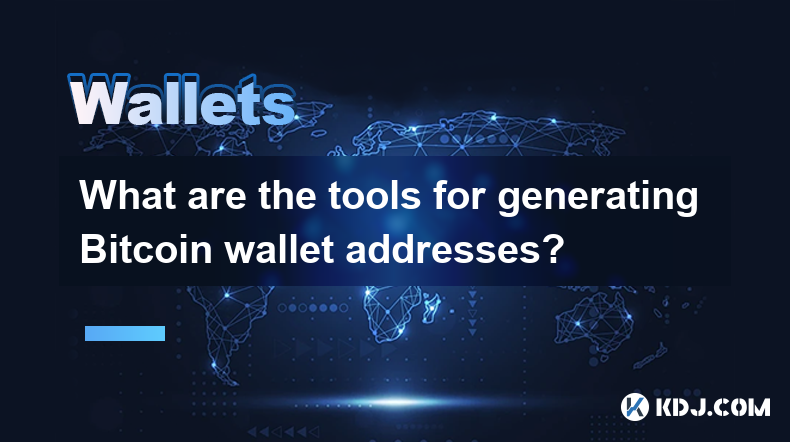
Key Points:
- Bitcoin wallet addresses are not generated directly; rather, they are derived from private keys using cryptographic hashing.
- Several tools, ranging from simple online generators to sophisticated software wallets, facilitate this process.
- Security is paramount; using reputable and secure tools is crucial to protect your Bitcoin.
- Understanding the underlying cryptographic principles isn't strictly necessary for using these tools, but it enhances security awareness.
- Different tools offer varying levels of security, functionality, and user-friendliness.
What are the tools for generating Bitcoin wallet addresses?
Generating a Bitcoin wallet address isn't a simple process of randomly generating alphanumeric characters. It involves complex cryptographic operations that ensure the security and integrity of your Bitcoin. Instead of directly creating addresses, tools generate private keys, from which the corresponding public address (your Bitcoin wallet address) is derived using cryptographic hashing algorithms like ECDSA (Elliptic Curve Digital Signature Algorithm). These tools handle the complex mathematics behind this process, making it user-friendly.
One of the most common tools is software wallets. These are applications installed on your computer or mobile device. Popular examples include Electrum, Exodus, and Mycelium. These wallets manage your private keys securely and automatically generate addresses when needed. They often offer additional features like transaction history tracking and multi-signature support. The level of security varies depending on the specific wallet and its implementation of security measures like hardware security modules (HSMs).
Another category is hardware wallets. These are physical devices designed for storing private keys offline, offering a high level of security against online attacks. Ledger and Trezor are two leading brands in this space. They usually come with their own software and generate addresses directly on the device, minimizing the risk of compromising your private keys. They offer a strong layer of protection against malware and phishing attacks, but they come with a higher initial cost.
Furthermore, many online wallet services provide Bitcoin wallets. These services handle the key generation and management for you, often simplifying the process significantly. However, it’s crucial to exercise caution when choosing an online service, as you're entrusting them with your private keys. Look for services with strong reputations and robust security measures. The trade-off is convenience for a degree of reliance on a third party.
You can also find command-line tools and libraries that allow developers to generate Bitcoin addresses programmatically. These are usually used by experienced users and developers for integrating Bitcoin functionality into their applications or scripts. They require a deeper understanding of cryptography and Bitcoin's technical specifications. The security relies entirely on the user's implementation and safeguarding of the generated keys.
Finally, there are online Bitcoin address generators. These are websites that provide a simple interface for generating addresses. However, using these generators is generally discouraged due to security risks. Since you're relying on a third-party website to handle your key generation, there's a potential risk of malicious actors compromising your private keys. Use them with extreme caution, if at all.
Understanding Private and Public Keys:
It's essential to grasp the relationship between private and public keys. Your private key is a secret number that allows you to spend your Bitcoin. It must be kept absolutely confidential. Your public key, derived from your private key, is used to generate your Bitcoin address. The address is what you share with others to receive payments. Think of it like your bank account number; you share your account number (public key/address), but you keep your PIN (private key) secret.
The tools mentioned above all work by securely generating a random private key and then deriving the corresponding public key and Bitcoin address from it. The specific algorithms and cryptographic techniques used vary depending on the tool, but the core principle remains the same. The security of your Bitcoin depends on the security of your private key.
Common Questions:
Q: Are online Bitcoin address generators safe?
A: No, using online Bitcoin address generators is generally not recommended due to significant security risks. You are entrusting a third-party website with the generation of your private keys, exposing them to potential theft or compromise.
Q: Which is the most secure way to generate a Bitcoin address?
A: Using a reputable hardware wallet is generally considered the most secure method. Hardware wallets store your private keys offline, significantly reducing the risk of hacking or malware attacks.
Q: Can I generate a Bitcoin address without any software?
A: Technically, you could use specialized cryptographic libraries and programming skills to generate keys and addresses manually. However, this is extremely complex, error-prone, and not recommended unless you are a highly experienced developer with a deep understanding of cryptography.
Q: What happens if I lose my private key?
A: If you lose your private key, you lose access to your Bitcoin. There's no way to recover it. This highlights the importance of securely storing your private keys and using backup mechanisms provided by your chosen wallet.
Q: Can I reuse a Bitcoin address?
A: While you can reuse a Bitcoin address, it's generally not recommended for privacy reasons. Each transaction associated with an address is publicly recorded on the blockchain, revealing the transaction history. Using a new address for each transaction enhances your privacy.
Disclaimer:info@kdj.com
The information provided is not trading advice. kdj.com does not assume any responsibility for any investments made based on the information provided in this article. Cryptocurrencies are highly volatile and it is highly recommended that you invest with caution after thorough research!
If you believe that the content used on this website infringes your copyright, please contact us immediately (info@kdj.com) and we will delete it promptly.
- 2025-W Uncirculated American Gold Eagle and Dr. Vera Rubin Quarter Mark New Products
- 2025-06-13 06:25:13
- Ruvi AI (RVU) Leverages Blockchain and Artificial Intelligence to Disrupt Marketing, Entertainment, and Finance
- 2025-06-13 07:05:12
- H100 Group AB Raises 101 Million SEK (Approximately $10.6 Million) to Bolster Bitcoin Reserves
- 2025-06-13 06:25:13
- Galaxy Digital CEO Mike Novogratz Says Bitcoin Will Replace Gold and Go to $1,000,000
- 2025-06-13 06:45:13
- Trust Wallet Token (TWT) Price Drops 5.7% as RWA Integration Plans Ignite Excitement
- 2025-06-13 06:45:13
- Ethereum (ETH) Is in the Second Phase of a Three-Stage Market Cycle
- 2025-06-13 07:25:13
Related knowledge
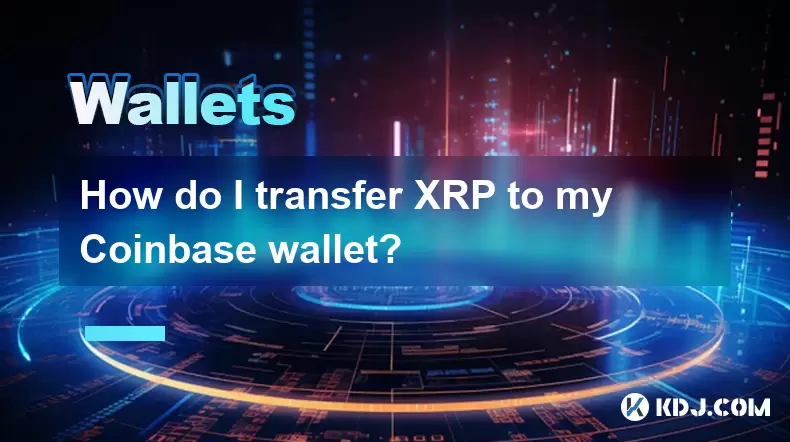
How do I transfer XRP to my Coinbase wallet?
Jun 16,2025 at 04:57pm
Understanding the Basics of XRP and Coinbase CompatibilityBefore initiating any transfer, it’s essential to confirm whether Coinbase supports XRP. As of recent updates, Coinbase has resumed offering XRP trading services on its platform after a period of uncertainty due to legal issues involving Ripple Labs. However, availability may vary depending on yo...

How do I deposit BNB into my Trust Wallet?
Jun 15,2025 at 03:56pm
Understanding BNB and Trust Wallet CompatibilityBefore initiating a deposit, it’s crucial to understand what BNB is and how it interacts with Trust Wallet. BNB (Binance Coin) is a utility token created by the Binance exchange. It can be used for paying transaction fees, participating in token sales, and more. Trust Wallet, on the other hand, is a mobile...
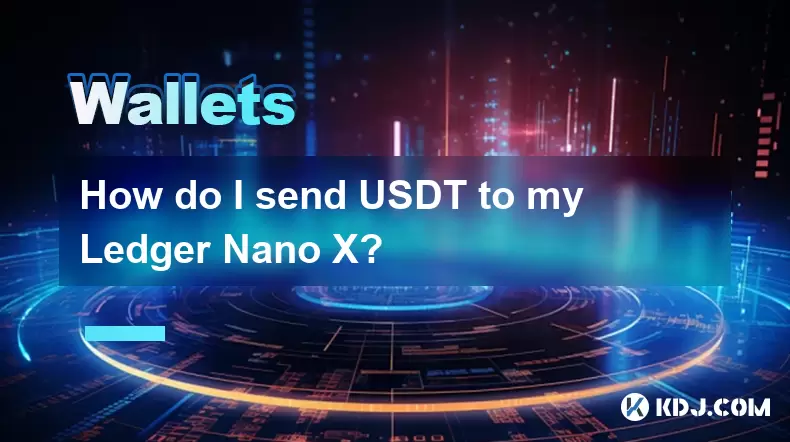
How do I send USDT to my Ledger Nano X?
Jun 15,2025 at 06:28am
What is USDT and Why Use Ledger Nano X?USDT, also known as Tether, is one of the most widely used stablecoins in the cryptocurrency ecosystem. It operates on various blockchain networks such as Ethereum (ERC-20), Tron (TRC-20), and others, offering users a digital asset pegged 1:1 to the US dollar. When it comes to storing USDT securely, hardware wallet...
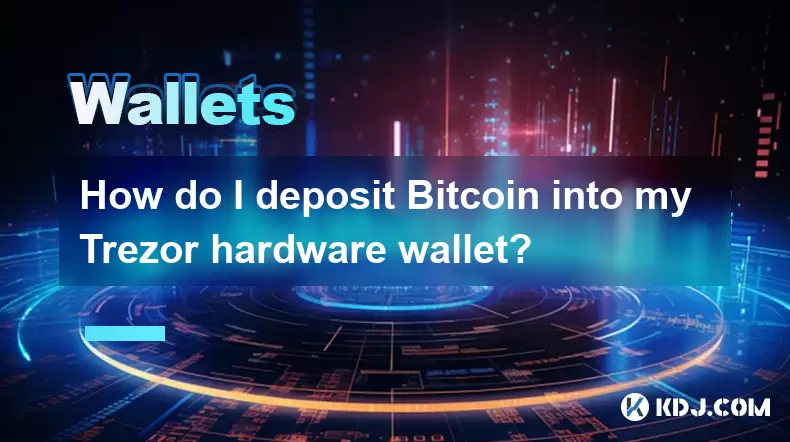
How do I deposit Bitcoin into my Trezor hardware wallet?
Jun 14,2025 at 12:29pm
What is a Trezor Hardware Wallet?A Trezor hardware wallet is a secure device designed to store cryptocurrencies offline, protecting them from online threats. Unlike software wallets, which are vulnerable to hacking and malware, Trezor stores private keys on the physical device itself. This ensures that transactions can only be approved by physically int...
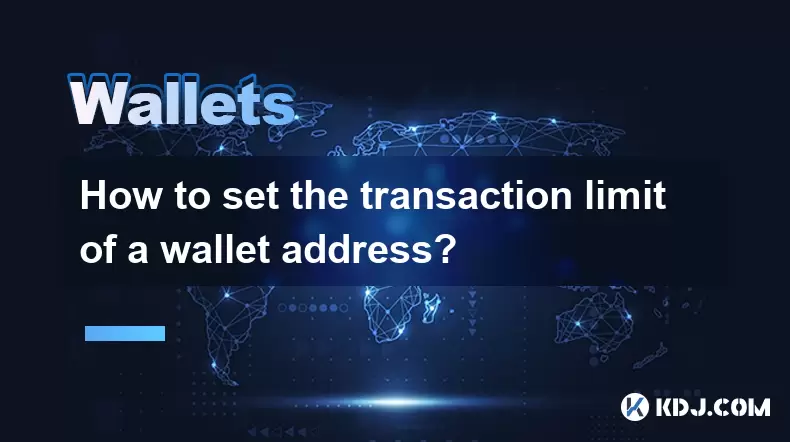
How to set the transaction limit of a wallet address?
Jun 16,2025 at 04:08am
Understanding the Concept of Transaction Limits in Cryptocurrency WalletsIn the cryptocurrency ecosystem, transaction limits refer to predefined restrictions placed on the amount of digital assets that can be sent or received by a wallet address within a specified timeframe. These limits are typically enforced by platforms such as exchanges, custodial w...
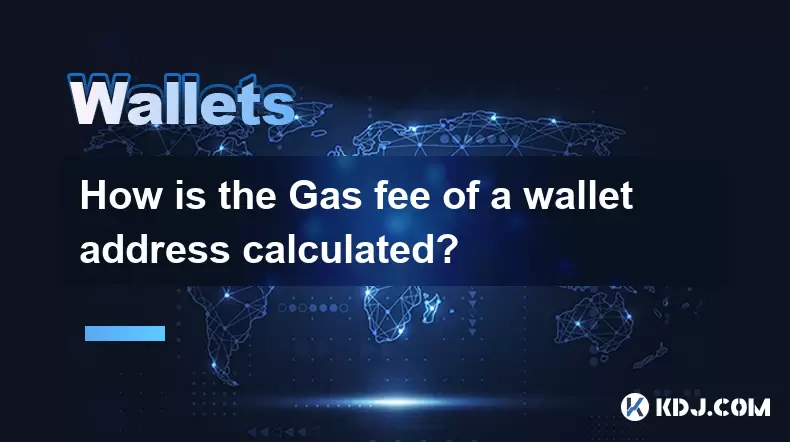
How is the Gas fee of a wallet address calculated?
Jun 14,2025 at 07:57pm
Understanding the Basics of Gas Fees in Blockchain TransactionsIn the cryptocurrency ecosystem, particularly within Ethereum-based networks, a Gas fee is an essential component of executing transactions or smart contract operations. The Gas fee serves as compensation for miners or validators who process and confirm transactions on the blockchain. It is ...

How do I transfer XRP to my Coinbase wallet?
Jun 16,2025 at 04:57pm
Understanding the Basics of XRP and Coinbase CompatibilityBefore initiating any transfer, it’s essential to confirm whether Coinbase supports XRP. As of recent updates, Coinbase has resumed offering XRP trading services on its platform after a period of uncertainty due to legal issues involving Ripple Labs. However, availability may vary depending on yo...

How do I deposit BNB into my Trust Wallet?
Jun 15,2025 at 03:56pm
Understanding BNB and Trust Wallet CompatibilityBefore initiating a deposit, it’s crucial to understand what BNB is and how it interacts with Trust Wallet. BNB (Binance Coin) is a utility token created by the Binance exchange. It can be used for paying transaction fees, participating in token sales, and more. Trust Wallet, on the other hand, is a mobile...

How do I send USDT to my Ledger Nano X?
Jun 15,2025 at 06:28am
What is USDT and Why Use Ledger Nano X?USDT, also known as Tether, is one of the most widely used stablecoins in the cryptocurrency ecosystem. It operates on various blockchain networks such as Ethereum (ERC-20), Tron (TRC-20), and others, offering users a digital asset pegged 1:1 to the US dollar. When it comes to storing USDT securely, hardware wallet...

How do I deposit Bitcoin into my Trezor hardware wallet?
Jun 14,2025 at 12:29pm
What is a Trezor Hardware Wallet?A Trezor hardware wallet is a secure device designed to store cryptocurrencies offline, protecting them from online threats. Unlike software wallets, which are vulnerable to hacking and malware, Trezor stores private keys on the physical device itself. This ensures that transactions can only be approved by physically int...

How to set the transaction limit of a wallet address?
Jun 16,2025 at 04:08am
Understanding the Concept of Transaction Limits in Cryptocurrency WalletsIn the cryptocurrency ecosystem, transaction limits refer to predefined restrictions placed on the amount of digital assets that can be sent or received by a wallet address within a specified timeframe. These limits are typically enforced by platforms such as exchanges, custodial w...

How is the Gas fee of a wallet address calculated?
Jun 14,2025 at 07:57pm
Understanding the Basics of Gas Fees in Blockchain TransactionsIn the cryptocurrency ecosystem, particularly within Ethereum-based networks, a Gas fee is an essential component of executing transactions or smart contract operations. The Gas fee serves as compensation for miners or validators who process and confirm transactions on the blockchain. It is ...
See all articles

























































































